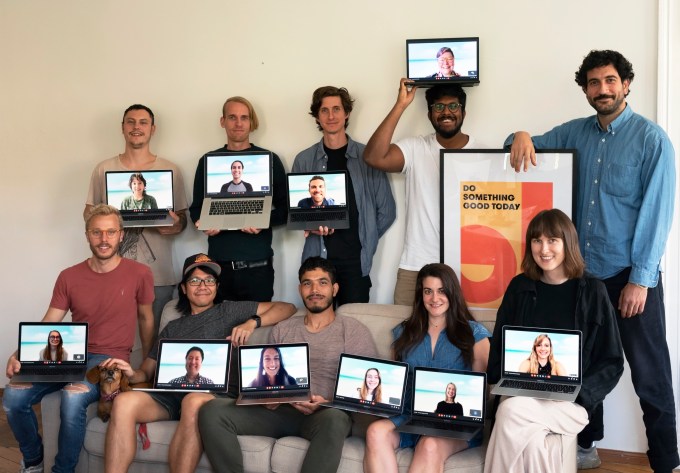If your employer does any sort of charity donation matching, the system powering it might be… not great. Maybe it’s got an ancient interface; maybe it’s stuffed behind the VPN at some weird URL that takes a half hour to dig up every December when you remember there’s donation match money about to expire.
Deed, a company out of the ongoing Y Combinator S21 class, is looking to modernize the Corporate Social Responsibility (or CSR) concept – and do a bit more to keep it on your radar, while they’re at it.
Deed’s web interface does much of what you’d expect of a platform like this. It’ll handle employee donations and facilitate donation matching based on the employer’s rules, and it’ll offer up volunteer opportunities and track volunteer hours accordingly. And it’ll do it all with a clean interface that shouldn’t look out of place and dated in a modern company’s toolset.
But it also offers up plenty of neat stuff I haven’t seen the alternatives do — like a dating app-style swipe interface for narrowing down volunteering opportunities, deeper support for employee resource groups (you can follow employee groups within your company, and those groups can highlight organizations you might want to donate to), and tools to promote a bit of friendly who-can-volunteer-more competition between departments. Next up: Slack integration.

Image Credits: Deed
This week Deed is rolling out an early build of its Slack tie-in which, as company co-founder Deevee Kashi tells me, is meant to “meet employees where they are.”
While Deed’s web interface isn’t going anywhere, this new integration lets them beam many of the most commonly accessed features – plus a feed of any donation/volunteer activity your coworkers opt to share – right into Slack. Easier access, harder to forget.
Deed is a bit further along than many of the companies we see coming out of YC. Many of the teams we see in each YC batch are made up of a couple co-founders working from whatever desk space they can find; Deed, meanwhile, has 20+ employees across the world and a growing HQ in Berlin.
But it’s still early days for the company – much of its growth, and even its focus on the enterprise, is relatively new.

Deed’s hybrid in-person/remote team Image Credits: Deed
Deed started its life in 2016 as an app with a similar, but different, focus. Kashi, coming off a ten-year stint of running night clubs and, as he puts it, “throwing parties for a living”, decided it was time to retune.
“Externally people perceived my career as being successful. Internally, I was very… distraught,” he tells me. “I wasn’t really connecting to what I was doing and, by any means, it didn’t align with my values.”
“I took a step back and decided to volunteer, just kind of locally in the city. After trying to volunteer, I realized how cumbersome the process was – how antiquated all the technology was, and how nonprofits were struggling to engage with younger demographics.”
From that came the first iteration of Deed, then an app meant to help individuals find the right volunteer opportunities for them. They grew a community of tens of thousands of users around New York… then the big companies came knocking.
“Their employees came to them and said they really enjoyed using the app in their free time,” says Kashi. “They’d assumed we had an enterprise offering as well to help them with their employee volunteering and engagement programs.”
After a bit more tugging at that thread, the team decided to go all in on enterprise in 2020. They’d take what they learned about building a pretty, modern interface for individual volunteering and adapt it for the needs of these big teams. And it seems to be working; they quickly signed their first big customer with Adidas. Then came Sweetgreen, Airbnb, and Stripe. Kashi tells me that they’re now working with companies with anywhere from 250 employees to 100,000.
Deed raised $2M at the end of last year – and with the momentum behind its shift to enterprise teams, saw its own team grow quickly. “We couldn’t afford two desks.” says Kashi. “Now we’ve hired a bunch of people over the past year and a half. And I’d never met them in person! Then all of a sudden I walk up and the entire floor is ours. It’s really surreal onboarding people remotely, managing them for a year and a half… and then seeing them for the first time.”
